December 2008
This Month's Contents: Your Strategy by Art Ticknor | A Poem by Shawn Nevins | Something That Stirs by Devin Thomas | Humor
Editor's Note
by Shawn Nevins
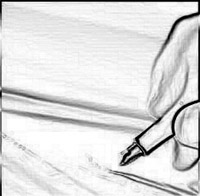 We published about sixty different articles, poems and excerpts in the TAT
Forum during 2008; a purposefully broad range of contributions that hope to
inspire and inform your spiritual path. I don't intend to change the format, but
am concerned that some of you may fall into the procrastinator's trap of drawing
endless conclusions and correspondences among paths and practices. The point of
reading is not to see the connections between Eckhart Tolle and Ramana Maharshi,
how the work of Douglas Harding complements that of Richard Rose, or tally how
many teachers use the phrase "awareness." The point is to find a practice and
do it. Find a teacher that resonates with you and plunge in, do the work
until you run into a wall, then try again. Work the system until you are at a
dead end, then try again, only moving on when you've truly beaten your head
against the wall and broken your tools. Then find a new system and begin again.
Again and again, falling and rising is how we make progress.
We published about sixty different articles, poems and excerpts in the TAT
Forum during 2008; a purposefully broad range of contributions that hope to
inspire and inform your spiritual path. I don't intend to change the format, but
am concerned that some of you may fall into the procrastinator's trap of drawing
endless conclusions and correspondences among paths and practices. The point of
reading is not to see the connections between Eckhart Tolle and Ramana Maharshi,
how the work of Douglas Harding complements that of Richard Rose, or tally how
many teachers use the phrase "awareness." The point is to find a practice and
do it. Find a teacher that resonates with you and plunge in, do the work
until you run into a wall, then try again. Work the system until you are at a
dead end, then try again, only moving on when you've truly beaten your head
against the wall and broken your tools. Then find a new system and begin again.
Again and again, falling and rising is how we make progress.
The teachers we read about are not spiritual Olympians. The search is accomplished through ordinary commitment applied to an extraordinary idea.
Your Strategy, by Art Ticknor
A question for your consideration: What's the best way to read an essay or listen to a talk? (I'm really asking, so I'll put a pause here for you to consider the question.)
If you just kept reading, it indicates you're looking for answers outside
yourself, from external authority. If you're looking for solid footing, on the
other hand, you'll eventually need to turn to an internal source and become your
own authority to answer the father of all philosophical questions.
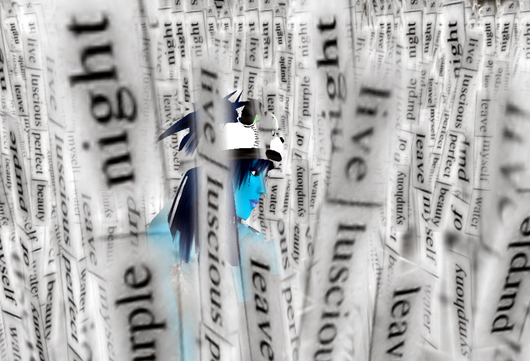
But to get back to the "best way" question, in the past I read and listened critically, sorting what I read or heard into things I agreed with, things I disagreed with, and occasionally something to look further into. These days I tend to pay attention not so much to the words as to what's behind the words. When you read or listen, you're following a strategy—consciously or not—that may be active or passive. You're at a point of non-action when you're consciously viewing that mental activity or relative inactivity.
You're reading this today because you're pursuing a strategy to get what you want out of life. You may also be reading it because there's something you need to "hear." If that's the case, I don't know what it is, and you don't know what it is, so we'll have to rely on accident … or on intelligence greater than human knowing. Would it bother you if you knew you were dependent on such an intelligence to find what you're looking for in life?
There was an old woman in Birmingham, Alabama who knew about that intelligence. William Samuel1 told about her in a weekend retreat he held in Georgia in 1993, which was filmed by PBS. Samuel (1924-96) was a soldier who became a metaphysician and then a self-realized man. He was commissioned a lieutenant at age 18 and fought for about three years leading a troop of Chinese soldiers in their resistance against Japanese invaders. His interpreter turned out to be a Taoist master, who Bill spent some time with after the war. He then returned to Birmingham and became a well-known Christian Science practitioner and metaphysician. Then in the late 1950s or early 1960s he awakened to a realization of his essential being.
In the 1993 retreat Bill told how twelve days earlier he'd had a massive stroke, which left him unable to speak or move. The quantum physicist David Bohm was to have been there, also, but likewise had suffered from a critical medical problem at about the same time. You could see that Bill was having some difficulty with his speech at the beginning of the weekend, but his astounding recovery continued and his speech improved noticeably by the end of the filming.
Bill told about having had open-heart surgery some years before, followed later by an angioplasty. Everything seemed okay, then the angioplasty collapsed … followed by a collapse of each of the earlier bypasses. His doctors apparently didn't give him any hope of surviving. He said he was lying in bed, should have already been dead, when an old woman who came in to take care of him leaned down and whispered in his ear: "Do you know what love is?" He said he was totally honest perhaps for the first time in his life and replied, "No. But I'd like to." She responded: "It doesn't matter. God loves you, and I loves you." He said he began healing at that instant.
I suspect she'd had a rough life, a life that had been tough on her pride. I also suspect that Bill's "total honesty" reflected the inverse of pride. The intelligence that healed him was what the old woman felt as love. And it was transmitted when he was in the receptive state of total honesty. The only impediment to its transmission at every moment—at this very moment—is pride.
Hunger
When you're hungry, you follow an action plan to satisfy that want. You're reading this because you have a hunger or thirst you haven't been able to satisfy. It may not be defined, but it's something you feel—an unfulfilled longing that's deeper than words. Feeling that longing, that deep want, is the starting point—always come back to that. Whatever put that want there does the work of satisfying it if you allow it.
Everyone has a strategy they're pursuing to get what they want out of life. It may be conscious or largely unconscious. Becoming conscious of your strategy is a step in the direction of waking up. Observing it may have an impact. Part of becoming conscious of the strategy is refining your understanding of the goal it's aimed at. Cooperating with that goal is equivalent to getting out of its way.
Regarding that goal, what is it that you really want? Answering the question requires becoming aware of the goal that your ingrained strategy is pursuing. In a workshop last September, I heard several people say basically this: "I don't know what I want. I guess what I really want is to find out what I want." A want is a feeling—a feeling that something's missing, or lacking. You have to feel it … and it's unpleasant. Knowing what you want is an interpretation of the feeling. It comes by using the tools at hand (intuition and reason), and it provides a tentative answer to the question: "What will satisfy the want?"
I was reading the autobiography earlier this year of Supreme Court Justice Clarence Thomas2, the African-American man whose 1991 Senate confirmation hearing was such a travesty. He's not at all the stuffed shirt I thought him based on seeing newscasts during the hearings, and his book is extremely honest and revealing. Anyway, one of the things that stayed with me was his description of how, as his 31st birthday approached, he took a day off and spent it at a law library with only pen and pad. The purpose? To focus on what he wanted out of life.
I heard an Internet interview recently of a British entrepreneur, Jim Mellon, who had written a book3 on financial planning with his business partner. His primary suggestion was to take a couple days, go away from the family and other commitments, and sit down and really think about what you're going to do when you're 65 and retired. He was referring mainly to financial planning, but his approach is a good one.
If you "know" what you want out of life, you're half way there. If you "don't know," when are you going to get serious?
Getting Serious
Getting serious is the equivalent of getting honest with oneself. Are you
serious about finding the truth of your existence? I'm not talking about running
around like your hair's on fire but of getting down to business—like Clarence
Thomas did. Gautama apparently got serious when he sat down under the Bo tree;
Jesus, when he spent 40 days in the desert; Paul Wood, when he put his head down
on his desk and prayed for God to kill him. Unless you spent time around Richard
Rose you probably haven't heard the story of Paul Wood. Richard said he was one
of a handful of people he'd met whom he felt certain were self-realized. Paul
had grown up a fundamentalist Christian and during World War II was a bombardier
dropping bombs on Japan. When he saw the devastation that he was part of, all he
could think of was what he'd learned from the Bible about how God was concerned
with the fall of every sparrow. But where was God while the bombs dropped?
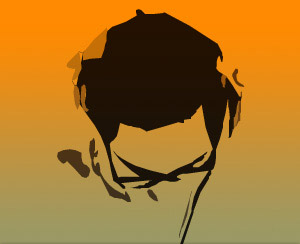
Paul became unable to function and was sent home to Texas. He couldn't hold down a job there, and his wife and kids left him. He said all he could do to try to figure things out was to say the Lord's Prayer, taking it apart phrase-by-phrase and word-by-word. He eventually found work as a used car salesman, but one day he was having a difficult time with a couple who were prospective customers, and he said he put his head down on his desk and prayed for death. He awoke a week or so later in a hospital, knowing the answer to his questions.
You can't force yourself to get serious. You basically have to run out of other options. As Winston Churchill quipped or complained about Americans, presumably because it took them so long to get into World War II, "They can "always be counted on to do the right thing—after they have exhausted all other possibilities." (His mother was an American, by the way.)
Surveys cited by Daniel Gilbert in Stumbling on Happiness show that: most students see themselves as more intelligent than the average student; 90% of motorists consider themselves safer-than-average drivers; and 94% of college profs consider themselves better-than-average teachers. "If you're like most people, then like most people, you don't know you're like most people," as Gilbert writes in his typically clever fashion. Are you more serious than the average seeker? Is your strategy going to keep you in the game until real seriousness grabs you?
The Strategy for Knowing the Self
The strategy for self-definition requires becoming your own authority. How is that done? By doing it on your own? By not being influenced by others? I've known people who have followed those strategies, and I agree that they are effective—for isolating yourself from possibly useful influences. They're really two sides of the same coin, the former ("no help") motivated by pride and the latter ("no influence") by fear.
It's far better to immerse yourself with people who are striving for what you're striving for, including those who may have preceded you down the path. But carve out alone time for yourself—daily, and occasionally for longer periods.
Do you become your own authority by thinking for yourself? I used to feel that it was the solution, but when I saw that all thinking is a reaction process, I realized that thinking for myself was literally impossible. What is possible, though, is to look for yourself with an unbiased eye not affected by thinking or feeling.
Whatever set of fears and desires is making the most noise determines your action or inaction—until there's sufficient detachment from identifying with the view (i.e., those fears and desires). To look objectively means not flinching from the contradictions you'll see about what you believe yourself to be.
Our primary desire is for eternal survival in a state of grand equanimity. Permanent healing brings us to that state when we realize the truth that "God loves us." The purest form of love is the identity of exact sameness. "God loves us" is equivalent to "God R us"—or "God is All, and all is God." Thus the search for permanent healing or satisfaction is the quest for knowing the self, for self-definition.
Going Within
The self is located, intuitively, within. Finding the self could therefore be described as going within. When you recognize that your hunger won't be satisfied by even the highest external games (for example, the metagames of art, science and religion in DeRopp's The Master Game), then the only possibility for satisfaction lies within … the game of discovering what you truly are.
Going within expands the view. But since the view is not the viewer, going within expands the view of what you're not. This is what Richard Rose termed retreating from untruth about what you are. It's a journey of disillusionment.
Like the zoom on a camera, when the lens is fully zoomed out, you get a close-up view. Retracting the lens expands the view. Eventually you back up to a blank wall or abyss … the boundary of the individual mind. And then a reversal of focus leads to a quantum jump or leap.
Speaking of focus, I hear friends who are attempting to know what they are but feel they aren't making sufficient progress say they need to focus more on self-definition. How is it done? Here's what Steve Jobs, Apple CEO, had to say about focus in a 3/17/08 Fortune magazine interview:
People think that focus means saying yes to the thing you've got to focus on. But that's not what it means at all. It means saying no to the 100 other good ideas that there are. You have to pick carefully…. Life is brief, and then you die, you know?
How Can You Gauge if You're Making Progress?
Are you moving … or are you just keeping busy? The journey is a chipping away at identification with what's not your essence, a backing away from faulty beliefs about what you are. An acid test: Have you seen anything new about yourself that dispels a previous belief/delusion?
What do you believe yourself to be? Until you become the consciousness that knows itself, you're stuck in the land of belief—and that's the source of your unsatisfied hunger. Fortunately, though, we're designed to look for the solid ground of certainty.
Are you challenging your beliefs about what you are? You first have to become conscious of your current self-definition then look for rigorous evidence of its validity—not what you read or someone tells you but first-person evidence that comes by looking for yourself. Admitting that you don't know what you are may be a sign of progress, but don't let it be a comfortable resting spot or insurmountable hurdle.
Why isn't everyone devoting every spare moment to conscious pursuit of what they want out of life? I hear friends say things like: "I don't know how … I'm lazy … I lack courage … I haven't found Grace," and so on. Those are all beliefs about what you are! All you have to do is look at your complaints and excuses to find beliefs.
Other signposts of progress include satoris, natural koans, and mental processes seen in slow motion. As an example of a satori experience, after a one-week intensive early in my years of searching I was back at work and found myself holding off something until the other workers had gone home for the day. Then I felt myself going "up" (although I was still conscious of being seated at my desk) and getting a view that my mind found these words to describe: "Something IS!" I realized with amazement that for something to be, an original something had to arise out of nothing—a logical impossibility. I felt myself seemingly going up a second time, and my mind found the following words to describe the second view: "Everything is just the way it is." This realization was actually an appreciation for the conciliation of opposites, seeing that "true" and "false" have equal validity from a view that transcends them.
A natural koan found me one time when I was doing a solitary retreat. It came in the form of a question that presented itself and latched onto my mind. "What is the source of my awareness?" was the first thought I awoke with, the last thought I went to sleep with, and was rather constantly on my mind for a couple days. It was wonderful. And then late one afternoon as I sat resting on a tree stump in the woods, an answer came in the form of a quiet vision: I saw that I was attached to something bigger than myself at the end of a long string. A few years later I heard Richard Rose say that every seeker has to find his umbilical cord, the mental umbilical cord connecting us to our source, and I knew then what I had seen.
An earlier time when I was on a solitary retreat it had rained for several days, and I was cold (having no heat source) and hungry (from fasting). When the rain ceased, I went for a walk and spotted a boulder on the edge of a stream with the sun shining on it. My first thought was how nice it would be to warm myself there. But then I saw a "no trespassing" sign posted on a nearby tree. And my reaction was fear that an unfriendly property owner might shoot me for trespassing. I found myself stopped in my tracks on the dirt road, watching the argument in my mind in slow motion. It was like a tug of war, with the opposing contestants trying to win their side of the argument. The "team" that finally made the most noise won the argument—a very primitive operation, indeed.
Another sign of progress is becoming less personal in your interests. We generally begin searching for happiness (emotional) or meaning (intellectual); later stages of the search gravitate toward truth or reality. What takes place is a refinement of your understanding of your deepest desire. What you believe yourself to be is shrinking; more view coincides with less self.
If Your Strategy Doesn't Seem to Be Working
At the heart of the struggle for self-realization is an opposition of wants: one is to be relieved of your burden, while the other is to maintain the feeling of being the final arbiter. The feeling that you are in control, or should be, is the basic symptom of the illusion of individuality.
It's no mistake that the first step in the AA 12-step program is admitting that your life is out of (your) control. Have you reached that point of honesty yet?
If your strategy doesn't seem to be working, it may help to look at it ("Sometimes you can observe a lot by watching," as the famous yogi of baseball, Yogi Berra, was credited with saying).
- The mind is an addiction machine. Bernadette Roberts4 at 17 was so good at disciplines that she realized the next step in discipline was giving up disciplines. (Don't overrate yourself on this!) Does your strategy condone habits?
- The mind's a forgetting machine. Gurdjieff5 urged his students to wage a war against (mental) sleep, devising alarm clocks to awaken themselves from daydreaming. Does your strategy compensate for forgetting?
- The mind's a distraction machine. "If you throw enough mud at the ceiling, some of it will stick," as Richard Rose would tell his listeners. Does your strategy divert energy from non-critical pursuits every day?
- The mind's a fickle machine. Does your strategy accommodate varying moods and convictions?
The spiritual path is contra-habit, contra-forgetting, contra-distraction, contra-fickleness.
For years I dreamed of being an architect. I read biographies of architects, studied their designs, luxuriated in their successes of creating beauty. But I never followed a strategy or action plan for becoming an architect. Are you merely dreaming about self-realization?
More Stumbling
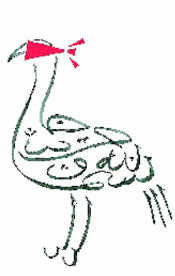
The author of Stumbling on Happiness cites a study in which 96% of the cancer patients claimed to be in better health than the average cancer patient! Does your strategy enable you to avoid the facts of your life?
Gilbert also notes in his witty style the many studies indicating: "The self considers itself to be a very special person." Is your strategy enhancing this conviction?
He tells us that 9 of 10 people say they'd regret a foolish action more than a foolish inaction—but that studies actually show that people of all ages and walks of life regret inactions more than actions. Does your strategy allow fear of making the wrong decision to lead to inaction?
Not making a serious commitment to yourself to pursue your deepest desire wholeheartedly is a way (a path, a strategy) to try to avoid something you fear. But will you regret it??
Footnotes:
(1) See
Selfdiscoveryportal.com for more on William Samuel's life and teaching.
(2) My Grandfather's Son: A Memoir, by Clarence Thomas
(3) The Top 10 Investments for the Next 10 Years: Investing Your Way to
Financial Prosperity, by Jim Mellon and Al Chalabi
(4) Contemplative: Autobiography of the Early Years, by Bernadette
Roberts
(5) G.I. Gurdjieff: The War Against Sleep, by Colin Wilson
A Poem by Shawn Nevins
|
I know that one word would dismantle me— |
Something That Stirs, by Devin Thomas
College isn't an easy place to become a morning person. Which was nice for
two years of my college experience, because I'm not a natural morning person and
my years of growing up and rising early to catch the school bus didn't encourage
early-morning practices, either. (Mostly it encouraged brief showering,
seconds-only tooth-brushing, haphazard dressing, and copious
running-down-to-the-bus-stop-so-as-not-to-miss-that-darn-thing.) And college is
much the same way: everything that's rich with the college experience (whatever
that means for you) happens at night. We stay up late and sleep in. We waste
hours of daylight. We sacrifice peace and tranquility for rushing and worrying -
will we make our first class? Will there be time for a quick bite? I used to
wake up wondering if my schedule would provide time for an afternoon nap.

But recently I've been drawn to the lifestyle of the early riser. I find it refreshing, calming, reflective. I like the dim blueish ambiance of the pre-dawn, like the explosion of yellows and oranges as the sun crests the horizon. I like the fact that I can pause, wake up slowly. I like staying in my pajamas and reading for an hour or two while my roommate snores his way through the day. Today I woke up at 6:30 for a breakfast date in north Philly. Staring at the waking world with bleary eyes provides a fresh outlook that is enlightening: it refocuses our internal perceptions and allows for moments of unexpected insight, uncommon camaraderie. A "good morning" from a neighbor. A palate of color from a previously overlooked mural. A tasty meal enjoyed with deliberate bites and interspersed with laughs and conversation.
Almost seven hours later I'm feeling more awake and more alive than I do on a day of sleeping late: fueled by an unnamed something that electrifies with the power of caffeine and soothes like the vapors of herbal tea. Like the rush of endorphins after exercise, the warm rich fullness of cocoa clasp by cold hands.
Maybe this is overly sentimental, overly dramatic. It's so foreign a feeling, though, to rise early and begin the day slowly. And it's tough to summon the willpower to commit to the morning. I cherish these moments because they are so few and far between: the times I give up the status quo and seek something of my own, something that allows me time to breath deeply and move with steady, determined paces. Something alive and not-yet-alive. Something that stirs.
Devin Thomas is a senior English major at Messiah College in Grantham, Pa. His essay "Something that Stirs" appeared on WITF's "This I Believe" and was originally published on his blog.
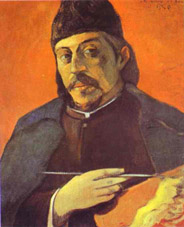 |
Humor....We never really know what stupidity is until we have experimented on ourselves. ~ Paul Gauguin |
Contributor's Corner:
Larry Davis, has written a couple of articles (Sept. 2007 and Nov. 2007) for the TAT Forum, and recently published an e-book titled The Outsiders. Here's what he has to say about it:
The Outsiders: Inside Out novelette is a story of Jason Long's spiritual journey. Jason is a reporter who notices serenely peaceful individuals walking the streets of a large metropolitan city. As he makes contact and is drawn further into their world, he transforms himself using their unique method of "awakening". We get a glimpse of another way of being and a group of individuals whose mission is to heal the world. Jason's story is told from the inside, as he experiences life. There are minimal references to spirituality and religion as the experiential elements take precedence. In other words, it is the psychological journey without a spiritual, religious or philosophical overlay.
The journey begins with Jason's awakening event and ends with the final resolution after several years of integration. The journey is similar in concept to Bernadette Roberts' Path to No-Self, but is secular in nature. The journey, in essence, is the shedding of conditioning and the cognitive mode that one needs to maintain it. It is a return to the innocence of childhood by letting the sensory/intuitive mode become fully awake and letting "being" become primary.
The Outsiders story may be downloaded in its entirety at The-Outsiders.org.


